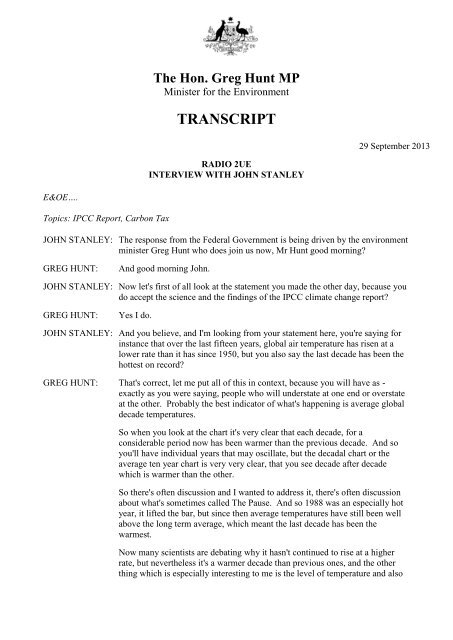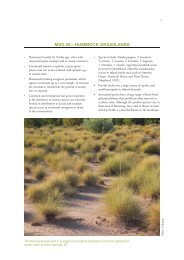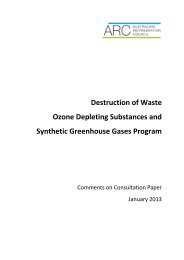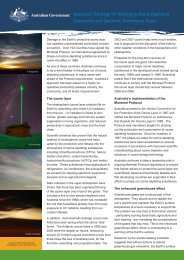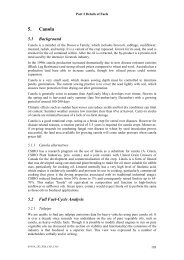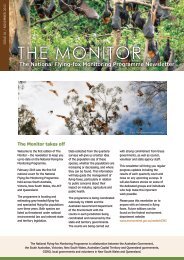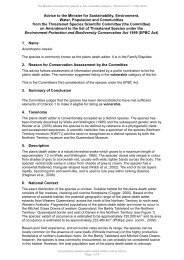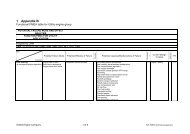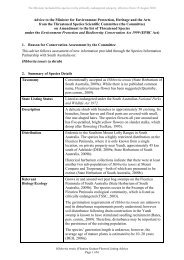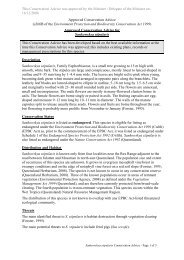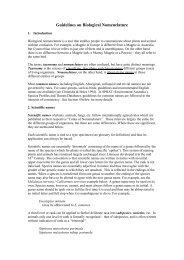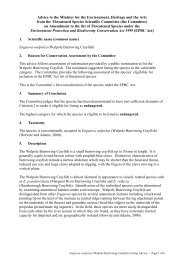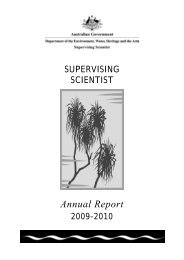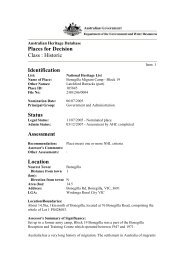Transcript: Interview with John Stanley (PDF - 184 KB)
Transcript: Interview with John Stanley (PDF - 184 KB)
Transcript: Interview with John Stanley (PDF - 184 KB)
You also want an ePaper? Increase the reach of your titles
YUMPU automatically turns print PDFs into web optimized ePapers that Google loves.
The Hon. Greg Hunt MP<br />
Minister for the Environment<br />
TRANSCRIPT<br />
29 September 2013<br />
RADIO 2UE<br />
INTERVIEW WITH JOHN STANLEY<br />
E&OE….<br />
Topics: IPCC Report, Carbon Tax<br />
JOHN STANLEY: The response from the Federal Government is being driven by the environment<br />
minister Greg Hunt who does join us now, Mr Hunt good morning?<br />
GREG HUNT:<br />
And good morning <strong>John</strong>.<br />
JOHN STANLEY: Now let's first of all look at the statement you made the other day, because you<br />
do accept the science and the findings of the IPCC climate change report?<br />
GREG HUNT:<br />
Yes I do.<br />
JOHN STANLEY: And you believe, and I'm looking from your statement here, you're saying for<br />
instance that over the last fifteen years, global air temperature has risen at a<br />
lower rate than it has since 1950, but you also say the last decade has been the<br />
hottest on record?<br />
GREG HUNT: That's correct, let me put all of this in context, because you will have as -<br />
exactly as you were saying, people who will understate at one end or overstate<br />
at the other. Probably the best indicator of what's happening is average global<br />
decade temperatures.<br />
So when you look at the chart it's very clear that each decade, for a<br />
considerable period now has been warmer than the previous decade. And so<br />
you'll have individual years that may oscillate, but the decadal chart or the<br />
average ten year chart is very very clear, that you see decade after decade<br />
which is warmer than the other.<br />
So there's often discussion and I wanted to address it, there's often discussion<br />
about what's sometimes called The Pause. And so 1988 was an especially hot<br />
year, it lifted the bar, but since then average temperatures have still been well<br />
above the long term average, which meant the last decade has been the<br />
warmest.<br />
Now many scientists are debating why it hasn't continued to rise at a higher<br />
rate, but nevertheless it's a warmer decade than previous ones, and the other<br />
thing which is especially interesting to me is the level of temperature and also
of sort of build up of CO - well carbon equivalency in the oceans. And those<br />
things are very very clear they continue to mount.<br />
JOHN STANLEY: And a lot of people are saying that global warmings stopped, you don't accept<br />
that based on what you've seen from the scientists?<br />
GREG HUNT:<br />
No, in Australia we have a scientific advisory group, which is the Bureau of<br />
Meteorology, the CSIRO and the Antarctic division of the Environment<br />
Department plus some other smaller agencies. Interestingly it never included<br />
the Climate Commission under the ALP, they had all of these bodies, they<br />
never included the Climate Commission.<br />
Anyway, the scientific advisory group which is very broadly in line <strong>with</strong> what's<br />
being said internationally makes the point that you have a progressive build up<br />
of CO2 in the atmosphere, it acts to trap heat to a degree and that itself<br />
progressively builds up.<br />
Now they have extraordinary work done on ice cores in the Antarctic, where<br />
we have a tremendous amount of research and another major research project<br />
in drilling ice cores this summer, and it all points in the same direction. Now<br />
my job is to make sure that we actually get a balanced response both in terms<br />
of understanding the science, and note that this is a one hundred year process.<br />
So we've had a nineteen centimetre rise in sea levels over actually just beyond<br />
a hundred –and-ten years, and it's now predicted that depending on the<br />
emissions ranges, it could be somewhere between twenty-eight and ninetyeight<br />
centimetres. So one is the lowest of the low, one is the highest of the<br />
high and it really depends on what decisions the great nations of the world<br />
make as to where we end up.<br />
JOHN STANLEY: Okay, so when the Sun Herald has a front page as it has today of what the<br />
potential might be <strong>with</strong> a sea level rise of eighty centimetres by 2100, that is at<br />
the higher end of the band that is being predicted by scientists if we don't do<br />
anything?<br />
GREG HUNT:<br />
That's correct. So always you look at what can we do and then what's the<br />
likely consequence of that. These people here are terribly pessimistic, I'm not.<br />
China and the US that are at the heart of the issue, get what's happening. Now<br />
they have different approaches to it, the United States in fact has had an<br />
enormous change in its emissions profile, because it switched from coal to gas<br />
in many instances.<br />
That's not universal of course, but there's been a proportionate switch. They've<br />
improved their industrial production, their economic health and they've also<br />
decreased their emissions in real terms, not just the rate of growth but they've<br />
actually decreased their emissions. So that's been a great plus for the world.<br />
The Chinese leadership are becoming increasingly serious because they have,<br />
not just the global concerns but also air quality concerns linked <strong>with</strong> old dirty<br />
coal fired power stations, where you have a sulphur dioxide impact, you have<br />
particulate pollution, you have air quality issues. So they are beginning to look<br />
very seriously at changes, and then the EU and Europe are the other major - the
EU and India are the other major players, and there's very serious movement<br />
there.<br />
So if we can get those four great groups of nations together, then that leaves the<br />
rest of the world in a position where we can get a good outcome, not a great<br />
outcome, but a good outcome over the next century.<br />
JOHN STANLEY: Well see I spoke to the Climate Institute yesterday, you'd be aware of them and<br />
they are at one <strong>with</strong> you in terms of accepting the science and believing we<br />
need to do something. They still believe it should be a carbon price or some<br />
sort of market based mechanism, and they say that your direct action plan<br />
won't work. And I put it to them, I said well what's the measure of how we<br />
assess whether the direct action plan is working and what are the benchmarks.<br />
So what benchmarks can you set for us that we can look at and how can we<br />
actually tell whether we're - whether it's working?<br />
GREG HUNT:<br />
Well there's a very simple benchmark here and that is do we reduce our<br />
emissions. Now under the carbon tax, what we see is that our emissions go up<br />
between 2010 and 2020, not according to the liberal party, but according to the<br />
modelling of all of the agencies under the ALP's own period in government.<br />
It goes up from five- hundred-and-sixty-one to six-hundred-and-thirty-seven<br />
million tonnes. What does that mean? It goes up an awful lot in Australia<br />
under the carbon tax and everybody will say but I thought this was meant to<br />
reduce emissions, and they're right it was meant to.<br />
The problem as we've always said is it's an electricity tax, electricity's an<br />
essential service and so people hurt in their lives, but electricity remains a<br />
fundamental good and so it doesn't actually transform the economy, it doesn't<br />
actually transform our emissions. In short lots of pain, very little gain and so it<br />
doesn't do the job it was intended to do.<br />
JOHN STANLEY: So that six-hundred-and-thirty-seven tonnes by 2020, would you see that as a<br />
benchmark that you can get it lower than that?<br />
GREG HUNT:<br />
Yes I do and yes we can.<br />
JOHN STANLEY And that will - and how quickly, will we get for instance next year or the year<br />
after or presumably we're talking starting this next year, so the following year<br />
or the year after, will we be able to get some measurable benchmark that we<br />
can then say okay well this is where we've gone and this has worked?<br />
GREG HUNT:<br />
Well each year we should be able to reduce our emissions through practical<br />
action. Because nobody on the ALP side ever actually talked about what the<br />
carbon tax is meant to clean up. It only works if it actually cleans up a power<br />
station or cleans up waste coal mine gas or cleans up waste landfill gas or<br />
encourages energy efficiency on a grand scale.<br />
And they're the sorts of things which an emissions reduction fund or a carbon<br />
purchasing fund actually goes and supports, but we do it on the market based<br />
background. We do it by a competitive auction to purchase the lowest cost<br />
goods. It's like purchasing a million pounds of wheat, you buy the lowest cost
wheat, you get a contract for delivery. It's exactly what we do, but we'll be<br />
buying the lowest cost way of reducing emissions in this country.<br />
It's actually very simple, it's what happens in many circumstances in many<br />
issues, many commodities around the world.<br />
JOHN STANLEY: Yeah so you'd hope to start that middle of next year?<br />
GREG HUNT:<br />
First of July 2014 and the big test between now and then, the country voted for<br />
a change of government, one of the fundamental elements arguably the<br />
fundamental element was the issue of the carbon tax, it was set out expressly in<br />
the first and last weeks of the election by Tony Abbott as the central<br />
referendum item.<br />
We would expect that the ALP will listen to the public and not stand in the way<br />
of lower electricity prices and not stand in the way of a system which would<br />
directly reduce emissions, rather than hope that jacking up the cost of living<br />
and jacking up the cost of electricity will cause so much pain that people will<br />
suffer.<br />
JOHN STANLEY: And by the time we get to the next election you'll be able to point - you would<br />
hope if you can get it in by the middle of next year, and you'll have two years<br />
of operating. You'll be able to point some substantial reductions in emissions<br />
that you'll be able to demonstrate flowing from your plan?<br />
GREG HUNT:<br />
Yes and of course we should be judged on that, so I fully expect to be the<br />
person that's judged on that. The thing that we do need to happen is for the<br />
ALP to respect the mandate of the people, your listeners, they voted. Some<br />
would have voted one way some would have voted another, but pretty clearly<br />
we've had as big a result as any since 1977, apart from that 1996.<br />
So in other words, in eleven elections this has been the second best result, the<br />
second most comprehensive result. So you would hope that they would say,<br />
this is the ALP, that the government of Australia changed, and just as we<br />
respected the mandate to repeal workchoices in 2007, they should respect their<br />
mandate to repeal the carbon tax.<br />
JOHN STANLEY: Right, and on the science of climate change, you've talked to Tony Abbott<br />
about this, is he at one <strong>with</strong> you on this in accepting the science as well?<br />
GREG HUNT:<br />
Yes he is, there's a lot of mythology here, on the floor of the house in I think it<br />
was June, Tony Abbott was asked a question about accepting the science. It<br />
was a curious thing which involved Rob Oakeshott, and he got up and made a<br />
very very clear statement that he accepts the science, we just disagree on the<br />
carbon tax.<br />
Because emissions go up on the one hand, but electricity prices also skyrocket<br />
so it doesn't do the job. That's the critical thing here, it doesn't do the job but<br />
boy it causes a lot of pain along the way.<br />
JOHN STANLEY: All right, Greg Hunt as always great to talk to you and I'm sure we'll have more<br />
conversations along these lines over the next three years. Thank you for your<br />
time today.
GREG HUNT:<br />
It's a pleasure <strong>John</strong>.<br />
JOHN STANLEY: Greg Hunt who is the Environment Minister, see I think it's really important to<br />
get all this into context in terms of what the Coalition Government believes and<br />
what they are doing,<br />
ENDS


